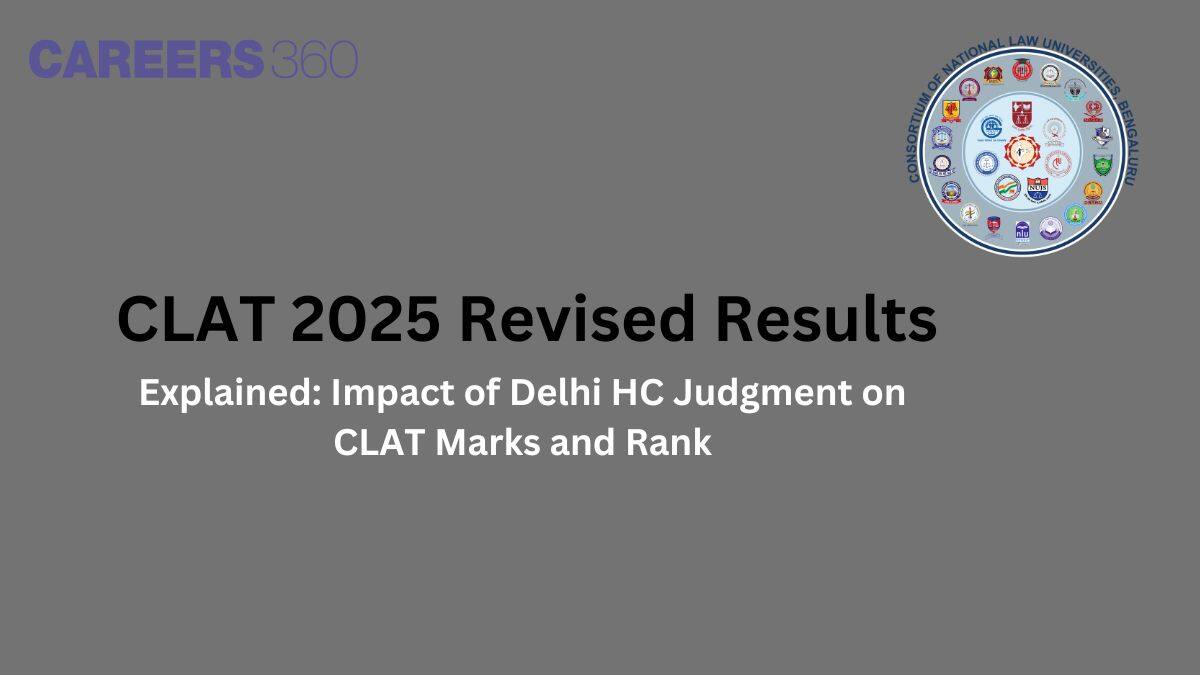CLAT 2025 Results: How Your CLAT Marks and Rank May Change After Delhi HC Judgment?
The Consortium of National Law Universities may soon revise the CLAT results after the directions given by the Delhi High Court. The scores and rank of many candidates will be changed if the results are revised. In one of the articles, we discussed how a single mark can change the CLAT rank and it can change by 1000 ranks too.

Now, let's try to understand how the CLAT scores will be changed and whether your grievances related to marks discrepancies will be taken into account.
So, just a brief about Delhi High Court’s judgment; question number 14 from SET A is modified whereas, question number 100 will be withdrawn. All remaining objections were rejected.
The court has directed the consortium to change the answer of Question number 13 from Option D, sellers of stolen hardware to Option C, Auctioneers of cheap drugs. Now, this is how it will change your CLAT marks;
Candidates who chose Option C for Question number 14
Changing the answer to set c means, some of the candidates who have selected option C will get one mark.
This will also remove the penalty of 0.25 marks. So, effectively, the candidate will get 1.25 marks.
Candidates who chose Option D for Question number 14
Now, there will be some candidates who might have selected option D as their answer and have got one mark for this. With these changes coming into effect, such a candidate will not only lose one mark but will also get a penalty of 0.25 marks. So, effective score will drop by 1.25 marks.
Candidates who chose Option A or B for Question number 14
Candidates who have selected option A or B will not have there score changed as they already have got a penalty of 0.25 marks.
Impact of Question no 100
Now, on Question no 100, the Court agreed with the expert committee and the question will be withdrawn, so it is unlikely to make any impact on those who have not attempted the question.
Candidates who marked option D
Such candidates are likely to lose one mark. Since the question may be withdrawn from the question paper, those who scored 1 mark as per the final answer key will be at a disadvantage.
Candidates who marked options other than D
Such candidates were penalised for 0.25 marks. Now, as the question has been withdrawn, they will gain 0.25 marks for this.
All these changes are subject to the consortium not appealing in the Supreme Court and agreeing with the Delhi High Court’s order. Further, on the marks discrepancies arising from the final answer key and results, the grievance portal of NLU Consortium is open and candidates can submit their objections.
Popular Courses and Specializations
Popular Degrees
List of colleges accepting CLAT
Browse Law Colleges by State
Questions related to CLAT
On Question asked by student community
Hello Santosh,
Domicile cut-offs are unpredictable. You can apply and get a seat only if the domicile category is selected. You can apply, but the chances of getting either of them are rare.
Most law colleges require entrance exams like CLAT or state-level law entrance tests. Some private universities may offer direct admission. Visit the official website of the college, fill out the application form, upload required documents, pay the fee, and complete counselling if required.
With a CLAT score of 71.35, you can apply for admission to NLU for mid-to-lower-tier NLU courses, with a state rank of 69.
With a CLAT 2026 rank of 33,825, it's difficult to get a seat at GNLU Silvassa in the initial stages.
You should focus on private institutions, where a CLAT 2026 rank of 33,825 has a higher chance of admission.
For information on domicile quota seats, see this - CLAT Domicile
You can check the admission chances of your daughter at specific law colleges by using the link provided below by entering the required information.
Start a career in Law. Admissions Open for LLB courses for
Among top 100 Universities Globally in the Times Higher Education (THE) Interdisciplinary Science Rankings 2026
Chandigarh University Admissions 2026
ApplyNAAC A+ Accredited | Among top 2% Universities Globally (QS World University Rankings 2026)
Manav Rachna University Law Admissions 2026
ApplyAdmissions open for B.A. LL.B. (Hons.), B.B.A. LL.B. (Hons.) and LL.B Program (3 Years) | School of Law, MRU ranked No. 1 in Law Schools of Excellence in India by GHRDC (2023)
RV University, Bangalore | Law Admissions 2026
ApplyExcellent curriculum; an impressive range of electives, besides core law courses. Up to 100% merit scholarship on a first-come, first-served basis
Unitedworld School of Law Admissions 2026
ApplyMoot Court | Mock trials | Legal Aid Clinic
SRM University, Chennai Law UG 2026
ApplyNAAC A++ Accredited | Ranked #11 by NIRF
